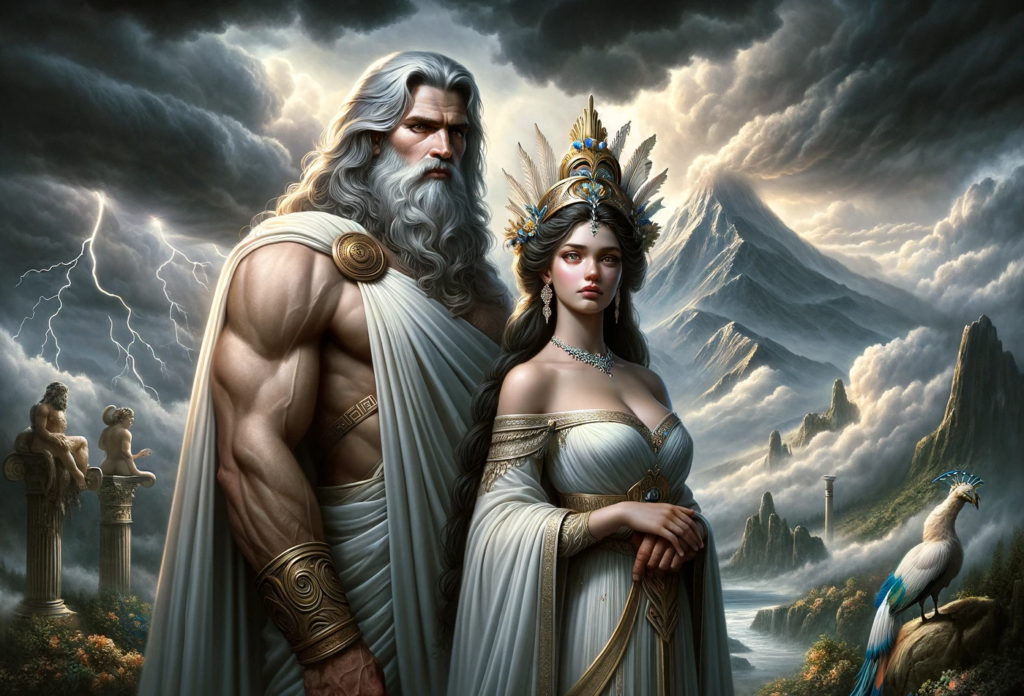Zeus and Hera are two of the most famous Olympian gods. They are also the parents of some of the most famous gods and goddesses in Greek mythology. Hera was the seventh wife of Zeus, and also his sister. Together, they had several children but Zeus also fathered children to other women while married to Hera, which resulted in some pretty well documented vengeance and wrath. Despite her feelings, Hera remained loyal and dedicated, a pure example of mothering strength and nurturing.
In this article, we will take a comprehensive look at their children, including who they are, what they do, and where they fall in terms of the Olympian hierarchy.
The Children of Zeus and Hera
Zeus had many, many children across his various relationships. He had seven wives and was also a bit loose with the mortals too (much to Hera’s vengeful distaste). Between Zeus and Hera however, they had either three or four children (two sons and two daughters) depending on the mythological sources.
The three uncontested children of Zeus and Hera are Ares, Hebe and Eileithyia. Then there is Hephaestus who was by some accounts a child to both parents, and by others a parthenogenous child of Hera alone.
There are also singular myths that present Angelos as another child of Zeus and Hera but the mythology around this is scarce.
Ares
Ares was the son of Zeus and Hera. He was the god of war, violence, and bloodshed. He loved nothing more than to fight, and he was known for his fierce temper and brutal nature. Ares was often depicted as a young man, clad in armor, with a spear or sword in hand.
He is well known as the lover of APHRODITE, who was married to his brother HEPHAESTUS, and though Ares plays a limited role in literature, when he does appear in myths it is typically facing humiliation.
For example, one famous story of Ares and Aphrodite exposes them to ridicule by the gods when her husband Hephaestus trapped them both naked in a bed using a clever device he made. Ares had several children with Aphrodite.
Hebe
Hebe was the daughter of Zeus and Hera. She was the goddess of youth and cupbearer to the gods. She was often depicted as a young woman, with a jug of nectar (the drink of the gods) in her hand.
In her duties, she was a faithful servant dedicated to the task that had been assigned to her. However, she was at some point down the line cast out from doing the job that she had previously had. She lost that job in a most unusual way when she tripped and her dress came undone. The other Gods were not happy about this at all and decided that they would take her role as cup-bearer away from her.
Hephaestus
Hephaestus was the son of Zeus and Hera. He was the god of fire, blacksmiths, and craftsmen. He was often depicted as a bearded man, with a forge and hammer in hand. In some accounts Zeus is not the father, but rather he is the child of Hera alone.
Hephaestus was cast out of Olympus, but there are varying stories as to the reason for this. In one story, he was cast out by his own mother because she found him to be lame and ugly. In another, he was cast out by Zeus for protecting his mother Hera from his unwanted advances.
Hephaestus was an engineer, but he was also stuck in his own workshop because he was lame and hunchbacked. One day, he got his revenge on all who had rejected him by building a magical throne that would trap whoever sat in it. Hera, without realizing the consequences of her actions, took the bait and sit in the throne – only to be incapacitated by it.
In order to free his mother he made that demand that the goddess Aphrodite would become his wife. Aphrodite was known for her allure and her ability to lure men into her bed. She was married to Hephaestus, but she had many affairs with other gods and mortals including his brother Ares.
It was in blacksmithing that Hephaestus was revered as a god, and was renowned for his crafting of the weapons for all the Gods in Olympus.
Eileithyia
Eileithyia, is perhaps the least well known of these children of Hera, yet still a significant deity in Greek mythology. She was revered as the goddess of childbirth and labor, with a crucial role in the pantheon. Eileithyia’s godly role was overseeing the most fundamental aspect of human life – the birthing process. Her presence was believed to be essential for the safe delivery of a child, and she was often invoked by expectant mothers and midwives during labor.
Worship of Eileithyia was widespread, with her primary cult centers located in Crete and Olympia where a shrine to her was made. The Cretan city of Amnisos housed one of her most prominent sanctuaries, where evidence of her worship dates back potentially as far as the Minoan era. This ancient connection underscores her longstanding importance in not just Greek, but pre-existing cultures.
Unlike other Olympian gods and goddesses, Eileithyia’s power is not displayed through epic battles or grandiose feats, but through the everyday miracle of birth. She is often depicted as a benevolent figure, easing the pain of labor and safeguarding the lives of both mother and child.
